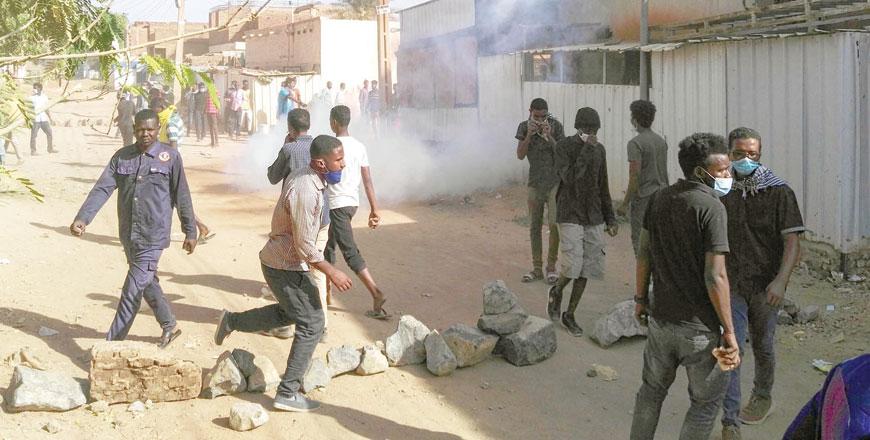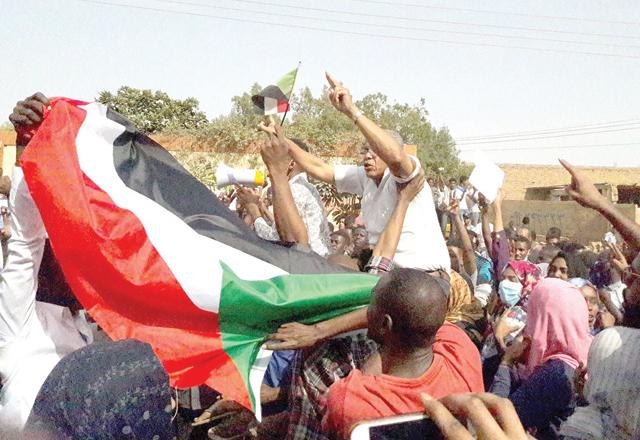You are here
Khartoum protesters rally against Sudan emergency
By AFP - Feb 25,2019 - Last updated at Feb 25,2019

Sudanese protesters demonstrate against their government in the capital Khartoum's district of Burri on Sunday (AFP photo)
KHARTOUM — Sudanese police fired tear gas on Monday at hundreds protesting in the capital Khartoum against a state of emergency imposed by President Omar Al Bashir to end rallies there, witnesses said.
Deadly protests have rocked Sudan for more than two months, and Bashir on Friday declared a year-long nationwide state of emergency to rein in the protest campaign.
The veteran leader, who came to power in a 1989 coup, also dissolved Sudan's federal and provincial governments as part of a major shake-up of his administration.
But protests have carried on, with demonstrators undeterred on Monday despite riot police firing tear gas at the crowds.
Chanting "freedom, peace, justice" — the rallying cry of the campaign — hundreds demonstrated in downtown Khartoum, witnesses said.
"We are challenging the regime and we are not scared of the state of emergency," said protester Erij who gave only her first name for security reasons.
"We have only one aim and that is to make the president step down."
Later on Monday, protesters also took to the streets in the Khartoum districts of Burri, Shambat and Al-Deim, witnesses said.
Burri has become a site of almost daily rallies, with protesters blocking streets and burning tyres and tree trunks.
Protest organisers, an umbrella group called Alliance for Freedom and Change, had called for Monday's "rally to challenge the emergency".
Riot police also fired tear gas into the compound of Ahfad University for Women after students staged a sit-in, witnesses said.
"Police fired tear gas when some students stepped out of the campus and began chanting slogans, that's when some canisters hit the compound," a witness said.
Protests first erupted in the town of Atbara on December 19 against a government decision to triple the price of bread.
They quickly escalated into demonstrations against Bashir's iron-fisted rule as protesters called on him to step down.
Officials say 31 people have died in protest-related violence since then, while Human Rights Watch has put the death toll at 51.
The 75-year-old leader has remained defiant, but has launched top-level changes in his administration.
He even sacked his long time ally and first vice president, Bakri Hassan Saleh.
On Sunday, he swore in a new prime minister and appointed 16 army officers and two others from the feared National Intelligence and Security Service as governors for Sudan's 18 provinces.
Sudan's financial woes have worsened amid a lack of foreign currency since South Sudan became independent in 2011, taking with it the bulk of oil earnings.
The resulting shortages in basic goods have fuelled spiralling inflation that has devastated the purchasing power and living standards of ordinary Sudanese, from agricultural labourers to middle-class professionals.
Related Articles
CAIRO — Sudan's President Omar Al Bashir on International Women's Day on Friday ordered the release of all women arrested in connection with
KHARTOUM — Sudanese police fired tear gas at crowds of demonstrators in the capital and other cities on Thursday, witnesses said, as fresh p
KHARTOUM — Sudanese police fired tear gas at protesters defying a nationwide state of emergency on Thursday, with demonstrators rallying in













